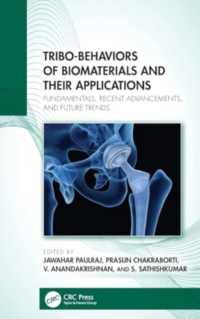- ホーム
- > 洋書
- > 英文書
- > Business / Economics
Full Description
In recent years, the concepts of determinism, causality, and explanation have taken on particular importance in the economic literature. Due to the failures of economic predictions based on mathematical models, philosophers and economists turned their attention to methodological issues. At the same time, heterodox approaches to economics have received increased attention, including the Austrian school of economics, an intellectual tradition that perceives economics as a science of human action and has emphasised the role of causal explanations practically from its inception. This book opens by exploring disputes in the philosophy of science over the fundamental goal of science. While instrumentalists argue that scientists should aim at good predictions regardless of the veracity of theories, according to scientific realists, they should look for knowledge that reflects reality. The book shows that the Austrian tradition adheres to scientific realism and can be perceived as a middle ground between historicism and positivism. It discusses the determinism/free will problem in economics and its methodological relevance. Then, it examines various theories of causality (regularity, counterfactual, interventionist, probabilistic, and process/mechanistic) and their applicability to economics. Finally, it explores possible and desirable types of explanations in economics. As the book tries to show, the Austrian school offers a unique and valuable approach to these issues. The book will be of particular interest to readers in economic theory, philosophy of economics, and economic methodology, especially those appreciating heterodox traditions.
Contents
Introduction 1. Truth or utility? Dispute over realism in philosophy of science and philosophy of economics 2. Austrian school as the middle ground between historicism and positivism 3. Determinism and methodological dualism: an epistemological inquiry 4. An Austrian perspective on causal relations in economics 5. Scientific explanation in the Austrian School Conclusion








